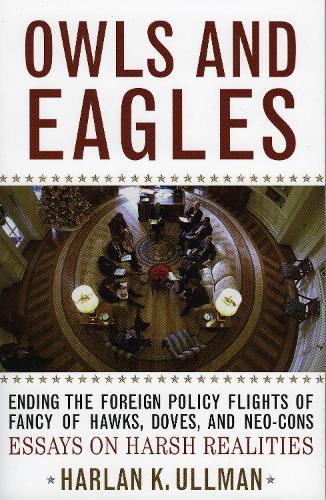
Owls and Eagles: Ending the Foreign Policy Flights of Fancy of Hawks, Doves, and Neo-Cons
(Paperback)
Publishing Details
Owls and Eagles: Ending the Foreign Policy Flights of Fancy of Hawks, Doves, and Neo-Cons
By (Author) Harlan K. Ullman
Bloomsbury Publishing PLC
Rowman & Littlefield Publishers
3rd June 2005
United States
Classifications
General
Non Fiction
International relations
Central / national / federal government policies
327.73
Physical Properties
Paperback
240
Width 164mm, Height 226mm, Spine 15mm
318g
Description
Leading national security strategist Harlan K. Ullman is well known for his aggressive, no nonsense approach to U.S. foreign policy. By his own description, he demands a smarter, realistic policy, one that is "informed by fact and reason and not ideology and tough when it must be." The time span of the author's columns, largely for the Washington Times , reprinted in this book is no coincidence. Owls and Eagles begins with the onset of the controversial U.S.-led war in Iraq in March 2003 and ends twenty months later, shortly after President George W. Bush's reelection. What overly ambitious, under informed goals inspired the U.S. to launch the preemptive war What were the domestic and electoral factors that led to the president's decision And, perhaps most importantly, what are the consequences of the unilateral war to the standing of the United States in the global community and to the legacy of George W. Bush These are the provocative questions contemplated in this important book. In the end, the author has achieved his goal of "informing the public and provoking them to think and to question how well or badly our nation was faring in the fight to keep us safe and secure."
Author Bio
Harlan K. Ullman, Ph.D., is a senior advisor to the Center for Strategic and International Studies, a prominent Washington, D.C., think tank, and a senior fellow at the Center for Naval Analyses. He is also a columnist for the Washington Times and a commentator on Fox News, BBC, and Al Jazeera. His military background includes skippering Swift Boats during the Vietnam War and commanding a destroyer in the Persian Gulf. He is the author of Finishing Business: Ten Steps to Defeat Global Terror (2004) and Unfinished Business: Afghanistan, the Middle East and Beyond-Defusing the Dangers That Threaten America's Security (2002). Ullman is credited for being the principal architect of the "shock and awe" doctrine that was adopted by the Pentagon.
